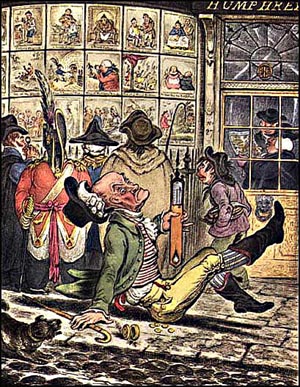 Fall
2003
Fall
2003
English 305A:
The English Novel 1700-1900
 Fall
2003
Fall
2003
Stephen
C. Behrendt
319 Andrews Hall
phone: 472-1806
office hours:
11:00 -
12:00 TR
and by appointment
James
Gillray, Humphrey's Shop
Daniel Defoe, Moll Flanders
Henry Fielding, The History of Joseph Andrews
Horace Walpole, The Castle of Otranto
Mrs. Mathews, Simple Facts; or, The History of an Orphan (on line;
see electronic syllabus for link to download)
Mrs. Martin, The Enchantress; or, Where Shall I Find Her? (on
line; see electronic syllabus for link to download)
Mary Shelley, Frankenstein; or, The Modern Prometheus
Charles Dickens, Hard Times
Robert Louis Stevenson, The Strange Case of Dr. Jekyll and Mr. Hyde
Aim of this Course
This course is a brief historical survey that includes some
of the more important British novels of the 18th and 19th centuries as well
as two lesser known ones. We will read eight novels, partly to become more fully
acquainted with them and partly to examine what they reveal about their relation
to the culture that produced them and which they both reflect and influenced.
While one aim is for you to become more familiar with studying literature within
these historical and cultural contexts, another aim is for you to become ever
better able to discuss such materials with sophistication, confidence, and skill,
both in class and on paper.
Teaching Method
We will work through intensive discussion based on your reading, with some occasional brief, ad hoc lectures to provide you with background information. Everyone will participate in one group presentation, and there will be opportunities for additional presentations for those interested. You should think of this course as an ongoing conversation among all of you. Because we meet only once a week, it will be especially important for you to have the assigned readings (or designated portions of them) prepared when you come to class each week, so that you will not fall behind or be unable to do well in discussions or on occasional surprise quizzes.
I will place on my website (see URL at the top of this page)
an electronically enhanced syllabus, with links to other sites, as well as a
set of study materials containing study questions for each novel as well as
supplementary research and study materials and active web links for the novels
and their authors. I expect you to use these materials in preparing for our
sessions; doing so will enable you both to read more effectively and to contribute
more meaningfully to discussions. We will o ccasionally work with these online
materials in our class meetings.
Requirements
1. Dedicated reading, in advance, of all the required novels,
plus class discussion of them. Note: This course will require considerable reading,
in some cases amounting to several hundred pages of prose fiction per week.
If you will not be able to handle this sort of reading load, you should not
enroll in this course.
2. Two examinations: a midterm and a final.
3. A research-based course writing project.
4. Participation in at least one group presentation.
What You Can Expect to Do in This Course
The Department of English has recently articulated its expectations about what sort of skills, activities, and experiences students should expect to gain or sharpen in courses at various levels of the curriculum. For courses at the 300 level (like this one), you should expect to do the following:
About What I Expect from You
While I do not expect you to be familiar with any of our material in advance, I do expect you to know how to read literary works with some insight and sophistication about both subject matter and the formal features of the genres. I expect you to come to class, to talk about what you read, and to share with one another as we try to make greater sense of the material we will study over the course of the semester. This will require some effort from everyone. It is generally assumed that preparing for one's university courses requires at minimum about three hours for every hour of class meeting time. That is probably about accurate for this course, although at times the reading load may require a greater investment of your time. If you cannot or will not make that sort of time commitment for preparing for our class meetings, you may want to think about whether you should remain in the group.
By
enrolling in this course you are acknowledging that you have received these
course guideline statements and that you accept their terms. If you are unwilling
to accept and be bound by these terms, you should withdraw from this course.
English 305A is both an Essential Studies and an Integrative
Studies course
As explained in detail in the Undergraduate Bulletin, Essential Studies (ES) courses are intended "to provide students a context for understanding the breadth of human endeavor." In the Humanities this is understood to mean "knowledge of literary, philosophical, or religious efforts to interpret and illuminate human experience."
Courses which are designated as Integrative Studies (IS) are part of a University requirement "intended to engage students in actively developing their ability and desire to analyze, evaluate and communicate complex material and positions." These courses are specifically intended to enhance the following skills:
In order to receive credit for this course (that is, to "pass"), you will need to participate actively in all the activities described above, all of which are integral to this course. There will be plenty of opportunities to do so, but because the University requires that all Integrative Studies courses follow all these guidelines, I am required in turn to enforce the expectations they reflect. You should know, by the way, that I fully and enthusiastically support all these expectations, which seem to me to constitute minimal expectations for courses in the Humanities at the college or university level.